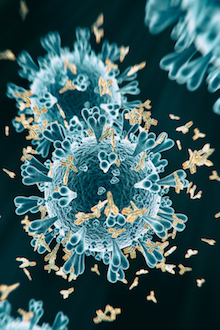
Several mechanisms could explain why some post-COVID patients continue to experience symptoms:
damage to specific organs, chronic inflammation, or possibly a breakdown of checks and balances in the immune system
Emory physicians have established post-COVID clinics to provide follow-up care for people who have recovered from their acute illnesses, yet continue to experience persistent symptoms such as shortness of breath, chronic pain, dizziness and neuromuscular weakness. Researchers plan to investigate the origin of “long haul COVID”, which can take a variety of forms.
The co-directors of the Emory Executive Park post-COVID clinic are Alex Truong, MD, MPH and Adviteeya Dixit, MD. Truong and Dixit started their post-COVID clinic in the fall of 2020, after seeing the need among patients who had been ill.
They have been expanding the clinic’s schedule, working to recruit additional physicians, and collaborating with other researchers to better understand the mechanisms behind long haul COVID.
“We’re trying to figure out why this happens in some people and not others,” Truong says. “And we want to follow patients over time to know if their symptoms get better or not.”
At the same time, Jenny Han, MD and Tiffany Walker, MD initiated a multidisciplinary post-COVID clinic at Grady Memorial Hospital, in collaboration with Aerica Summers, MD, medical director of Grady’s Purple Pod Clinic. Thanushi Wynn, MD has been caring for post-COVID follow-up patients from Emory Johns Creek Hospital and Emory Saint Joseph’s Hospital.
Truong, Dixit, Han and Wynn are all assistant professors of medicine in the Division of Pulmonary, Allergy, Critical Care and Sleep Medicine at Emory University School of Medicine, while Walker is in the Division of General Internal Medicine.
The clinicians say one of the most common persistent symptoms is shortness of breath, which may suggest diminished lung function, although other causes such as pulmonary embolism, even after acute illness, may be contributing. Wynn notes that some patients may be able to prevent chronic lung damage with timely treatment by an experienced pulmonologist.
However, the symptoms some COVID-19 survivors have been reporting extend beyond the pulmonary realm, indicating that viral infection has inflicted injury on other systems of the body. They include chest pain upon exertion, irregular heartbeats (cardiac arrhythmias), and dizziness or a racing heart when someone stands up after lying down (postural orthostatic tachycardia syndrome). In addition, a number of post-COVID patients are reporting loss of smell or taste, altered sensations in their limbs, chronic pain and/or brain fog (problems with memory, concentration or word-finding).
While the doctors coordinating the post-COVID clinics are pulmonologists or family medicine physicians, they are gathering a diverse group of specialists who can investigate patients’ specific issues and provide guidance on best care, including cardiologists, neurologists, psychiatrists, rheumatologists, otolaryngologists and rehabilitation specialists.
Several mechanisms could explain why some post-COVID patients continue to experience symptoms. Some problems may come from damage to specific organs, such as the heart. But others may come from chronic inflammation, or a breakdown of checks and balances in the immune system, says immunologist F. Eun-Hyung Lee, MD, who is working with the clinicians to study post-COVID patients.
“Not every one has all of the symptoms,” Lee says. “We want to be very systematic and quantitative about this.”
The Emory research team is investigating what factors may contribute to the risk of developing long COVID. They are collecting blood samples from post-COVID patients and establishing a biorepository to store them. In addition, they are conducting detailed interviews and neurocognitive tests to assess symptoms. The researchers have already examined about 100 post-COVID patients.
Initially, Truong says the group of patients he and his colleagues saw were mostly people who were sick at home and had not been hospitalized for COVID-19. More recently, that balance has shifted toward more people who had been hospitalized, he says.
For the post-COVID clinics, eligible patients should have tested positive for SARS-CoV-2 via RT-PCR and it should be at least four weeks after discharge from the hospital or resolution of the acute infection. Physicians can make referrals to the Emory Executive Park post-COVID clinic by calling 404-778-3261, and to the Grady post-COVID clinic by placing a referral.
